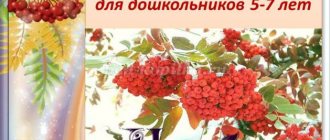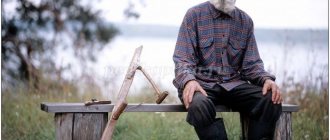Long-term planning for familiarization with the outside world in the middle group
Tatyana Gromova
Long-term planning for familiarization with the outside world in the middle group
Forward planning
to get to know the outside world
in the middle group .
Educator: Gromova T.V.
№ Lesson topic Program tasks
September
1 Target walk “We are walking along the street”
Form ideas about the street;
draw children's attention to houses, buildings for various purposes, sidewalks, roadways. Consolidate knowledge about the name of the street on which the kindergarten is located; Encourage children who know the names of their streets. Explain how important it is to know your address. 2 “Gathering the Harvest”
Expand children's understanding of vegetables, berries and fruits.
To consolidate knowledge about seasonal changes in nature.
3 “When my friends are with me”
Form the concepts of “friend”
,
“friendship”
. Cultivate friendly relationships between children, encourage them to do good deeds; teach cooperation, empathy, care and attention to each other.
4 "Good Doctor Aibolit"
To instill in children an interest in their health, a desire to maintain it with healthy food containing vitamins - vegetables and fruits. Clarify and expand ideas about the distinctive features of vegetables, that they can be eaten raw and boiled, that they can be used to prepare soup and salad; in their raw form they are healthier - they contain a lot of vitamins that are essential for health.
October
1 "Autumn Drops Gold"
Expand children's understanding of autumn changes in nature.
Show the objects of the ecological trail in the autumn. Develop a caring attitude towards the environment .
Give basic ideas about the relationship between man and nature. 2 “Don’t stop us from working”
Teach children
to group objects according to purpose;
cultivate a desire to help adults. 3 “The bear has mushrooms in the forest, I take berries”
.
To consolidate children's knowledge about seasonal changes in nature. Form ideas about forest plants: mushrooms and berries.
Expand your understanding of the benefits of natural vitamins for humans and animals. 4 "Journey into the Past of Clothes"
To acquaint children with the purpose and functions of clothing necessary for human life. Learn to establish a connection between the material and the method of using clothing items; lead to the understanding that a person creates objects to make life easier. Develop the ability to navigate the past of clothing.
November
1 "Autumn Gatherings"
To consolidate children's knowledge about seasonal changes in nature.
Expand your understanding of the life of pets in the winter season. Create a desire to care for pets.
2 "My Family"
Introduce the concept
(family)
. Give children an initial idea of family relationships. Cultivate a sensitive attitude towards the closest people - family members.
3 "Guests from the Forest"
Give children ideas about the life of wild animals in winter.
To develop an interest in the surrounding nature .
Foster a caring attitude towards animals. 4 "Our village"
Continue to consolidate children’s knowledge of the name of their native village and introduce it to its sights. Bring to the understanding that the people who built the village tried very hard and did their job well. Foster a sense of patriotism and pride in your village.
December
1 “It’s winter, it’s white all around”
Expand children's understanding of winter phenomena in nature. Learn to observe natural objects in winter. Give basic concepts about the relationship between man and nature.
2 “Why did the Snow Maiden melt?”
Expand children's understanding of the properties of water, snow and ice. Learn to establish basic cause and effect relationships.
3 “A flock of bullfinches on rowan branches”
Expand children's understanding of the diversity of birds.
Learn to identify the characteristic features of the bullfinch. Create a desire to watch birds flying to the site and feed them.
4 “Good New Year”
Introduce the traditions of the holiday;
learn to describe Christmas tree decorations; develop attention and thinking. January
1 "Winter forest"
Continue to introduce children to the forest;
to form realistic ideas about the life of forest plants and animals in winter, to develop an understanding that their lifestyle and condition are influenced by the conditions in which they find themselves;
develop gaming skills. 2 “Beauty of Russia”
. To consolidate children's knowledge about the nature of Russia, about the Russian national costume, about Russian folk tales, nursery rhymes. To instill in children a love for their Motherland, to evoke a feeling of admiration for the beauty of Russian nature and the talent of the Russian people.
3 "In the world of indoor plants"
Expand children's understanding of indoor plants: their benefits and structure. Learn to distinguish indoor plants by appearance.
February
1 “We are going, going, going...”
Introduce children to the general concept of “transport”
. Teach children to identify various characteristics of objects, compare them, find essential characteristics and, based on essential characteristics, generalize objects into one generic concept.
2 "In the Cold North"
Continue to consolidate children's knowledge about the nature of the Far North;
develop in children a cognitive interest in the life of animals and birds of cold countries.
Cultivate love for native nature. 3 “Defender of the Fatherland Day”
To give children an idea of the soldiers who protect our Motherland, to clarify the concept of
“defenders of the Fatherland”
; every nation, every country has an army.
Introduce children to some military professions (sailors, tank crews, pilots, border guards)
. Foster pride in our warriors.
4 “In Grandma’s Yard”
Introduce children to cows , pigs and goats as domestic animals, to form ideas about what animals are fed, how they are cared for, and what they get from them;
clarify ideas about adult animals and young animals; develop imagination, the ability to enter into a game situation, and compare. March
1 "My mom is the best"
Help children understand how much effort and time housework takes from mothers. Cultivate in them a kind, attentive attitude towards their mother, a desire to help her.
2 “Spring in the Forest”
Introduce children to the features of forest life in the spring. Form ideas about the life of forest animals.
Learn to support an imaginary situation. 3 “Objects that surround ”
Strengthen children's ability to find objects of the man-made world in
the environment ;
learn to describe an object, naming its name, details, functions, material. 4 “We can’t live without water”
Clarify children’s ideas that water is very important for all living beings; plants, animals, and humans cannot live without it.
April
1 “If you really want to, you can fly into space”
Give children an idea of space.
Introduce the first cosmonaut - Yu. A. Gagarin. Expand your vocabulary with nouns (space, planet , star, spaceship, rocket, astronaut, adjectives (stellar, solar, cosmic)
; verbs
(fly, land, launch)
.
2 “Tour of the Zoo”
Form ideas about wild exotic animals: lion, tiger, elephant, monkeys, crocodile;
provide basic information about where they live in nature, what they eat, and how they get their food. 3 “Our friends are books”
To instill in children an understanding that vivid impressions from nature can be interesting to talk about, they can be beautifully depicted in drawings; clarify ideas about E. I. Charushin as a writer and artist; cultivate a desire to participate in a common cause - creating an interesting book about nature.
4 "Tell us the tree"
Clarify children's ideas about trees growing on the site
(2-3 types)
. To give an idea that trees serve as material for the appearance of various wooden objects, that untreated wood has a light yellow color, smells pleasant, is warm to the touch, light, hard, but softer than stone; it can be sawed, planed, drilled, nails can be driven into it; Wood is used to make furniture, window frames and doors, and flooring; All wooden objects must be taken care of and repaired on time, so that fewer living trees are cut down for wood.
May
1 "Glorious Victory Day"
. Give an idea of the holiday - Victory Day; to cultivate respect for veterans of the Great Patriotic War.
2 "We went to the meadow"
Expand children's understanding of the diversity of insects.
Reinforce knowledge about the structure of insects. Develop a caring attitude towards the environment .
Learn to guess riddles about insects. 3 “Our kindergarten is good - you won’t find a better kindergarten”
Clarify children's knowledge about kindergarten. (A large, beautiful building with many cozy groups , a hall, a spacious kitchen where chefs prepare food, a medical office where children are treated. The kindergarten is reminiscent of a big family where everyone takes care of each other). Expand knowledge about people of different professions working in kindergarten.
4 “How to grow vegetables in the garden”
. Expand children's understanding of vegetable crops. Show the work of a person in growing vegetables.

